Latest Contributions
Read More Contributions
All those Years of my School-life: An Introspection, Sixty Years Later
Category:

Bal Anand was born in 1943, in a village about 20 km south of Ludhiana, in a family of saint-scholars who practised Ayurveda. Graduated from DAV College, Jalandhar, and did Master in English Literature from Govt. College, Ludhiana. After a stint for a few years as lecturer, joined the Indian Foreign Service. Served in nine different countries and retired as India's High commissioner to New Zealand. Now reading, reflecting and writing in nest in Greater Noida.
The result of my Matriculation Examination, the life-defining culmination of the ten years of studies in school, then conducted by the Panjab (note spellings) University, Chandigarh, was declared on 16th of June in 1959. When introduced in 1897 - with 1,779 candidates declared successful - by the then Punjab University, Lahore, the examination used to cover the entire original-i.e. the Punjab of Five Rivers- and also included the vast territories of the native states of the region.
The two pages of the Gazette of Panjab University Matriculation Examination 1959 pertaining to my school - M.G. M. N. Normal &\; High School, Ahmedgarh, District Sangrur- are shown below. A total of 144 students - a new record in our school-had appeared. One hundred and ten students had passed, and 17 students had scored First Division marks - the highest in the history of the school until then. And, four students had scored above the prestigious total of 600. Our Principal, S.L. Khosla, PES (Retd.), was happy!
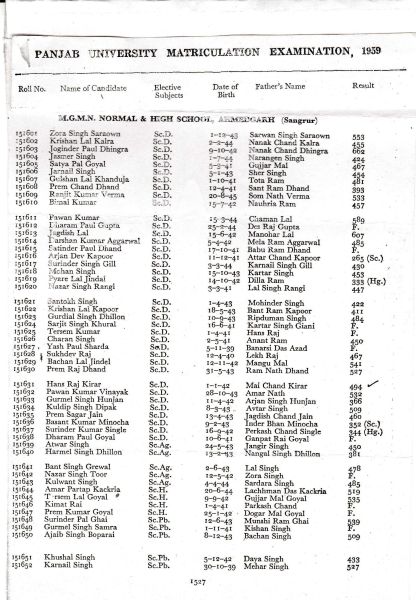
Marksheet of all students. 1959.
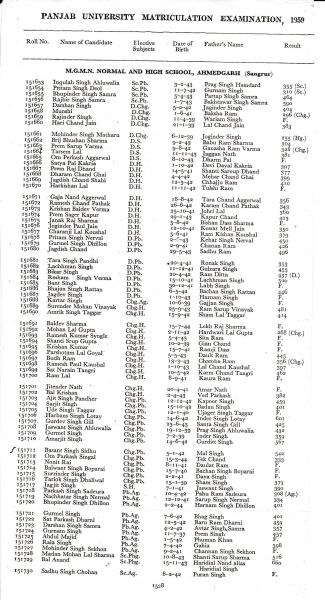
Marksheet of all students. 1959.
My school class of 1959 had been divided into three sections: A, B, and C. My closest friend and the topper - with 662 marks out of a total of 850 marks- was Engineer Joginder Pal Dhingra, who died in sad circumstances last year. I had stood second with 660 marks. Shri Pawan Kumar Vinayak, Indian Police Service - my class fellow up to BA and my roommate for a year in the hostel of DAV College, Jalandhar - has retired as Director-General Police, West Bengal.
Who is the richest of all among our class fellows? There is no easy answer because of income tax issues! I have been paying income tax since my very first job as a lecturer in Government College in 1967 - with a salary of Rs.520 per month! Prof. Amarjit Singh, a born poet, known for his Haazir Jawab ready wit and my close comrade in the cultural programs in the school, has indeed retained his extraordinary sense of subtle - and not so subtle - humour and the wisest witticism.
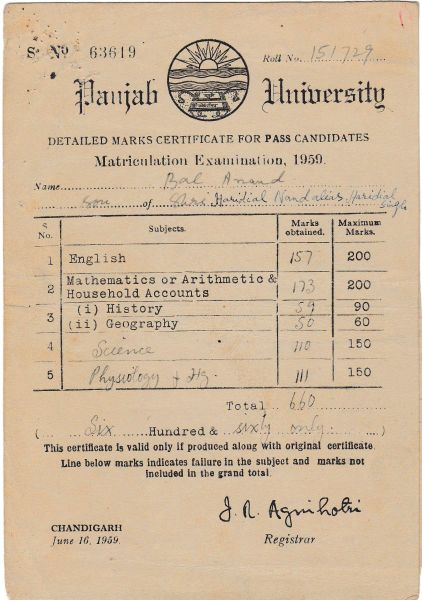
Bal Anand Marksheet. Matric exam. 1959.
The performance in terms of the marks obtained in the Matriculation Examination had indeed remained- right up to 1960s in free India- the gateway to some Pukki sarkari naukri (pensionable government job) in the various categories of civil administration / public utilities. It was also considered the benchmark - a sovereign standard of the entrance to the select portals of higher education in the region.
Shri M. S. Randhawa ICS has mentioned in his autobiography that he had obtained 520 marks, while his twin brother had got 519 marks in their matriculation examination in 1924. Shri I. D. Pawar, the first untouchable to be appointed a Judge in Punjab, had got a scholarship by obtaining 676 marks in 1927. My father-in-law had stood first in district Gurdas Pur in 1938, obtaining 645 marks. Shri S. D. Bhambri, Indian Administrative Service (IAS) of 1950 batch, had scored 732 marks in 1939.
Shri Ajit Kumar, IAS 1964, had stood first in the university in 1954 obtaining 748 marks as a student of Arya High School, Ludhiana. To meet Ajit Ji who had also been a national Junior Tennis player and record holder in MA in English has been a rare privilege indeed - almost comparable to Everest conqueror Sir Edmund Hillary! I continue to marvel and be amazed by this continuity of relationship of high score in the Matriculation examination and later distinctions in life!
The Matriculation examination of 1959 of the Indian (East) Panjab, in a way, had signalled the sunset of more than six decades of the old institutionalized system. I have given details about this examination in my article at http://diplomat.anandweb.com/2009/10/revisiting-school-five-decades-later.html. I have made an earnest endeavour to look back at my hours and years in school a decade back - the so-called golden jubilee of passing out of the school.
The introduction of Higher Secondary, and also the 10+2 school system had soon led to the establishment School Boards in the newly carved states and entrusting to them conduct of all school level examinations. The proverbial and prestigiously celebrated graduation, the mythic and magical ‘B.A.' -Bachelor of Arts / Science. -was also replaced by the Three Year Degree Course -called the TDC-in the colleges of Punjab and other neighbouring states.
I vividly recall how Prof. P. D. Chaudhary, our tall, towering and popular Professor of English of the Lahorian vintage, known for his use of ‘bombastic vocabulary' had mournfully addressed our class in DAV College, Jalandhar about ‘the passing away of ‘good, old and venerable B.A.' into history of the higher education, deriding the new system as ‘Tiddi-Dal Classes-hordes of locusts'! As they say, birth pangs accompany all innovative learning processes\; there are no gains, without pains. All animate beings seem to be blessed-or condemned-to learn until the last.
I have often been roaming about in my beloved school in my dreams and my stream of consciousness- to dwell upon the millions of myriad memories-above all, the most magnificent ones of an angel of a teacher-an eternal mythic Guru - Ashni Kumar (1916-1999). He had indeed remained my life long mentor-anchor and a Pole star in the Anant Brihamand - limitless multiverse-of knowledge and nobility. Let me describe an overwhelmingly prescient and insightful-eerie and inexplicable, of course, an actual event of my 10th class, on July 15, 1958.
It was exactly the eve of the beginning of the summer vacation in my school way back on July 15, 1958. I had been studying for three months in the ‘do-or-die', 10th Grade - the final class of the MGMN (Mahatma Gandhi Memorial National) High School in a tiny town in southern Punjab. The school was to remain closed for two months - a period long enough to confuse the minds of young students for the vague psychological time-span. All the enormous instructions about the tons of home - tasks during the 'big' vacation had been loudly and clearly indicated - verbally and also on the black boards by the teachers of various subjects.
The newly appointed and youthful Sardar Karnail Singh, B.Sc. B.T, teacher of mathematics and science underlined that those who studied regularly during the vacation would have nothing to fear about the final examination. The stern looking, the senior tough task master of English and social studies, Ashni Kumar, had prescribed the certain number of essays and letters to be written and ‘memorized' and ‘solving' the entire set of the ten-year old papers of the University! The students had spread the ‘story' that this stick-thin teacher had a weight of only 39 kg at the age of 39! The old students used to proclaim that for the weight of his vast knowledge, he could be compared to the weight of the whole universe! But in terms of his physical frame, he might just be equal to the weight of the uniform of a Russian soldier!
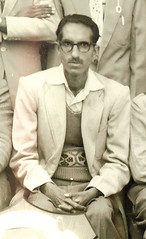
Master Ashni Kumar. 1957-58
Then, as per the practice adopted for a few previous years, Ashni Kumar summoned us - the three top adjudged students of the B-section. He told us that we would be taught by him for a special one-hour session for the first one month of the vacation - of course, free of any fee, as it used to be in those good old days!
So, came the 15th of July, and we three students reached the school in time at the indicated 0930 hours. Master Ashni Kumar - already there, coming out of the office room - directed us to fetch four chairs and a smaller table under a neem tree in the courtyard of the school. He joined us soon. Looking at our school bags full of books, he gave us an angry and dirty look, saying, "You fools, did I ask you to bring all these text books during this period of holidays ... now study these books only at home!"
We started wondering what could be in store for us. The teacher soon spread out the newspaper The Tribune, on the table. We had certainly not come prepared for all this! I had, of course, started ‘glancing through' The Tribune in my 7th class, mainly to read about the cricket matches. The visit of the New Zealand team in 1955-56 had been of particular interest: A.G. Kirpal Singh, of the then Madras State Team, had scored a century in his maiden test appearance at Hyderabad\; the opening wicket partnership of 413 runs between Vinoo Mankad and Pankaj Roy in the 5th Test still remains a world record!
How strange and mysterious a co-incidence that I was watching the first India-New Zealand Test in Wellington, Dec.12-16, 2002 i.e., 46 years later, in the company of the great Kiwi all-rounder, John Reid, who was the vice-captain of the team in 1955-56!
Coming back to the day of 15th July, 1958 in the school, the teacher asked me to read aloud the big banner headline on the first page of the Tribune which boldly proclaimed, "Coup d'etat in Iraq, King Faisel killed, Prime Minister Noori also assassinated". The first word posed a big and serious problem - wrongly printed! Mis-spelt? I was simply speechless. I could feel that the teacher had also a sort of inexplicable curiosity on his face - he still insisted that I should read the headline aloud. I did obey and started reading, pronouncing ‘Coup d'etat' with full emphasis on letter ‘p' sounding like, ‘koop de etatte' in Iraq....'
There was a small smile on the lips of the teacher and he said, "t is not your fault... it is strange... you got a word to read which is not of English but of the French language...". He started explaining patiently, "In this French word, the letter ‘p' is not pronounced and 'd' and 't' are pronounced softly - indicating the two equivalent letters in Hindi". We tried to lip-imitate what the teacher pronounced a couple of time more for us.
Then the teacher went on to explain the meaning of the word, "sudden violent overthrow of a Government. In Hindi, it could be ‘Hinsatamak Achanak Raj Parivartan'... ‘Hakoomat Ki khoon-Bhari Tabdeeli, etc.' Further on, we had no difficulty in reading - and half understanding - the remaining part of the news report. We read, "The Crown Prince also killed and his dead body hung high at the main gate of the Al-Zahoor Palace ... the body of Prime Minister Noor-es-Said dragged in the streets of Baghdad... The new leader of Iraq is Brig. Abdul Karim Kassem." The last one appeared an impressive name for my early - teen mind!
The above introduction to the French word, Coup D'etat has indeed ever since been etched in the deepest recesses of my mind. During my career as a diplomat, I had to attend the 14th July Reception in the Embassy of Iraq on several occasions, in several capitals - the incident at school would always flash before my eyes! I also saw the ‘illuminations' in the sky in the Saudi capital, Riyadh when the Patriot missiles intercepted the Scud missiles fired during the war in Kuwait.
As for my school teacher, Ashni Kumar, he remained my ‘Unique Guru' as long as he was alive - and he lived an active intellectual life till his last in the ripe old age. Hhe had predicted his own long life explaining that he had got disciplined himself to all the physical ailments since early childhood! We had a long and lively exchange of views through letters on all the topics under the sun - more of all this in the columns of South Asia Post around the Teachers' Day in September.
I have been able to retrieve all the 33 letters written to me by Guru-teacher Ashni Kumar between July 1983 and February 1998. I do recall how he had - as the first little step - guided me to write a post card in English to order the supply of books of model Test Papers for practice during the last few months of the 10th class. It was then I had come to know the meaning of the V. P. P. Value Payable Post! These letters, in his neat and clean handwriting, had regularly conveyed to me the developments in the country\; even his views on the global events and of course the local news, particularly the welfare of his many old and younger students. The period of extremist violence in Punjab had deeply disturbed him, and he expressed his anguish, quoting poets and patriots.
My Guru-teacher was always keen to know about the lives of people of the countries of all my postings. He felt sad but was satisfied to be told about the reality of the miserable state of affairs in Communist Romania\; the glories of Spain in arts and literature, and the ridiculously all-pervasive role of religion in Saudi Arabia. My visits to places like Lahore, Taxila, Nankana Sahib and my meetings with eminent people in Pakistan - his beloved land of birth, upbringing, education and early career as a teacher were of deeply emotional interest to him.
Interestingly, Mohammad Jamal, one of his most diligently groomed students, had been able to visit Master Ji's native place Jheeran Wali, near Gujarat - the family Bhatia Hakims was respectfully remembered by the elderly people. Master Ji had named his first grandson after his brightest student -Kuldeepak. He had told me about a personal diary, even hinting that it would be given to me\; it, somehow, simply disappeared after his death. I could, however, get to see his another meticulously maintained notebook in which he had been recording the main points of the news reports and articles from The Tribune, pertaining to the period of December 1986 to March 1991. I had shown this notebook to Editor Harish Khare of the Tribune during my meeting with him to present my book ‘Expressions of Freedom. Khare, however, appeared to be totally consumed with his piercing arrows of editorials!
In one of his letters, Ashni Kumar had quoted a couplet,
Mein Khud tou Kuchh bhi nahin
I am nothing on my own
Meri Qeemat hai, aap se!
I am what I am because of you.
amplifying that aap (you) implies / stands for his Students!
He had also observed that he did not or could not write about his life, and that he would be happy to survive in the memories of his students - and they might even write about him! Dr Krishan Baldev Vaid (b. 1928), an internationally renowned author in English and Hindi, was his student in the school in Pakistan. He has amazingly recalled how ‘first deserve, then desire' was the favourite quote of his young teacher, Ashni Kumar!
Shri Amrit Lal Jain-Matric 1950- MA, PCS (Retd.)\; Sohan Lal Bansal-Matric 1951-a legendary teacher of Mathematics and the most dedicated progressive activist in Punjab\; Kuldeepak Singh Dhillon-Matric 1954-IRS (Retd.), Dr Sushil Kumar Matric 1956-a prominent scholar and writer. Many other students of the small town of Ahmedgarh have told me how Master Ji had helped and continuously inspired them to aspire and achieve in their careers. This unique teacher, indeed, eminently deserves a book of tributes of memories by his grateful students. Time would, however, appear to have been totally transformed as a commerce for such devotional deeds.
I must finally mention how he had organized an open debate in the school ground in 1955, participated by students, teachers and even the Chaudhries (prominent personalities) of the town- on the topic: "Sattyug aa riha hai -beetia nahin (Dawn of Age of Enlightenment is about to break: it has not passed away)!". This cultural event had turned out to be an immensely popular affair: reflecting, in a way, the patriotic enthusiasm and optimism in the wake of Independence and faith in the leadership of Jawaharlal Nehru!
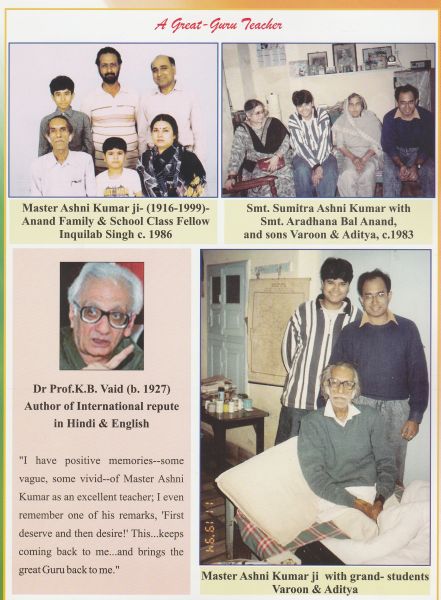
Collage of photos.
To sum up, I will try to put on record ‘Ten Takeaways' on the sixtieth anniversary of my ‘graduating' to be a ‘Matriculate'. I have no second thought in solemnly reaffirming that MGMN High School-with Master Ashni Kumar Ji as the guiding angel has been the single most transformative factor in shaping and influencing my entire journey of life. I may try to enumerate some innocently touching and uniquely memorable moments during the years of school.
1. Award of 75 / 75 marks in the House Test in Geography of fifth class in Dec 1953. This had brought me in contact with Shri Ashni Kumar.
2. Encouragement in fifth and sixth classes by Shri Yash Pal, a young teacher of English awarding ‘fair, very good, excellent' in my English handwriting note book.
3. Selection to participate in a Radio Program in 8th class in Oct. 1956. Apart from the huge acclaim in school and even the town, I had got Rs. 7.50 for speaking for two and half minutes (the present rate is understood to be Rs. 250 / per minute)!
4. The God-sent heavenly facility of Municipal Reading Room. For a few years, it was even located just below my home. It gave me the rare privilege of reading all the newspapers / magazines of all languages. The two persons in charge, promoted from sanitary staff for their elementary education, remained my lifelong friends and benefactors.
5. Playing of cricket in district schools team and a cultivation of deeper interest in reading about all the sports. The ultimate ecstasy was hosting the reception for Indian Cricket Team in Dec. 2002 as High Commissioner to New Zealand!
6. Winning of an extraordinarily impressive Shield, along with my popular class fellow Amarjit Singh, at an inter-school' declamation contest held in Dhuri in November 1957. This further stimulated and reinforced in me an abiding and deeper interest in literary activities and study of literature.
7. The emotional support, including occasional financial help, and affection bestowed upon me by Shri Bachan Singh Tailor Master, for whom I had been writing letters for years to his relations. I could listen to news-even cricket commentary on his radio!
8. Spoken English had never been a part of the learning at school till the recent craze for English medium - not even in the college up to M.A. This has continued to play havoc with the dreams of tens of thousands of the brightest minds in independent India. A separate column is needed to elaborate on this degrading hypocrisy in India and my own titanic struggle and tons of tragic and hilarious anecdotes about the art and craft of speaking the Queen's tongue!
9. I chose to speak to several class fellows of the school on the 16th of June, and was quite convinced once again that our life, in the ultimate reckoning, is a mysterious sequence of good, bad and totally unforeseen events\; the early traits of character and promise could prove to be totally deceptive.
10. My most favourite song during the school years used to be
Mutt bhool arre insaan\; teri neki -baddi, nahin uss-se chhippi, sab dekh raha Bhagwan!
Don't forget - God is seeing everything - good and bad - that you do,
Sung by Mohammad Rafi in the film Mastana released in 1954
Dearest friends, heartiest greetings and all the best wishes on the 60th anniversary of our coming of age via the Matriculation certificate. Please feel free to share this message with more and more friends
humm sabh musafir hain ab ek hi manzil ke
All of us are travellers with the same destination
naa jaane kis ko kab, kahan, kaise, kyon neend aa jaye!
Who knows who will fall asleep when!
____________________________________________________________________________
© Bal Anand. Published July 2019
Comments
Provide your contact number
Add new comment